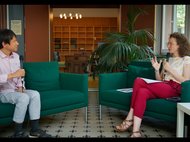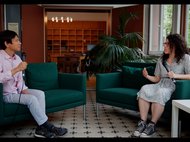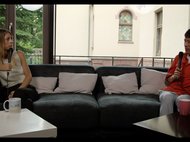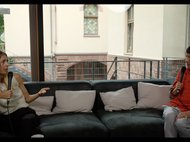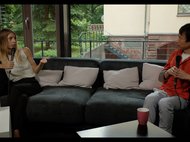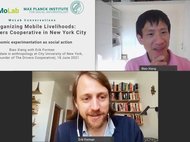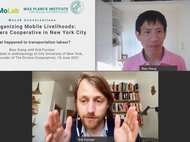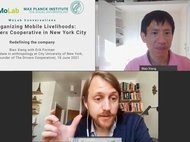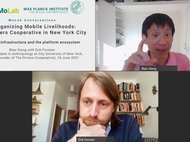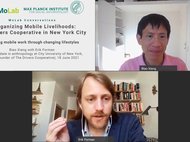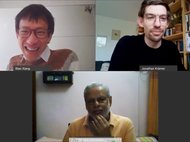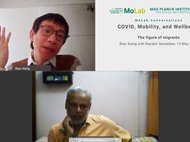Mobile Work
Mobility has historically been a means of work for many: herders, drivers, vendors, beggars. Today’s digital platforms like delivery and e-haling taxi businesses have turned mobility itself into a precisely measured task and a tradeable commodity. Through such platforms, one can buy a piece of mobility service—or “outsourced” mobilities—for the sake of safety, convenience or efficiency. And one can sell one’s mobile labour, measured by time and distance. What are the relations between capital, labour, technology, regulation and public perception in these new mobile forms of work?
Text Entries | Conversations in video or audio
The shipping industry is one of the most globalized business sectors, as are seafarers’ unions and welfare organizations. In this MoLab instalment, Luisa Piart and Biao Xiang discuss the remarkably efficient transnational labour and welfare organisations serving the interest of seafarers in many port cities around the world.
Luisa Piart is a Postdoctoral Research Fellow at the Max Planck Institute for Social Anthropology. Conversation recorded on 27 July 2021
Ships move between and beyond different jurisdictions. This, however, does not mean the ships and work onboard is beyond regulation. On the contrary, seafaring vessels are highly regulated working environments. In this conversation, Luisa Piart and Biao Xiang highlight the legal complexity of the shipping industry. They discuss the main actors who adopt and enforce strict regulations on board, the bureaucratic principles that govern the shipping industry, and their impacts on seafarers’ work.
Luisa Piart is a Postdoctoral Research Fellow at the Max Planck Institute for Social Anthropology. Conversation recorded on 27 July 2021
Ships are one of the most demanding working environments. Crews on commercial ocean-going vessels are typically multinational. The global labour market for seafarers is structured along racial and ethnic lines. Most seafarers come from the Global South. They work on short-term contracts and are paid less than colleagues from the Global North. In this video, Luisa Piart and Biao Xiang discuss how mobile labour is organized through this globalized but segmented market.
Luisa Piart is a Postdoctoral Research Fellow at the Max Planck Institute for Social Anthropology. Conversation recorded on 27 July 2021
A circular economy is meant to address environmental concerns by leveraging corporate interests. However, the circularity of the circular economy is by no means automatic. It is instead conscious work by specific actors that links corporate agendas, NGO programmes and e-waste dealers on the ground. In this video conversation, Juli Perczel and Biao Xiang explore how connections among heterogenous actors are made and what its social implications are.
Recorded on 27 July 2021. Juli Perczel is a PhD candidate in Anthropology, University of Manchester, UK.
Why does the humanitarian sector rely on mobile workforce, and how is the personnel’s mobility facilitated and conditioned? — Julia Morris, Biao Xiang
Many western governments outsource and contract migrant-sending and -transit countries into their border enforcement and frontiering projects. What changes does this spell for the world order? As foot soldiers, mobile workforce arguably play a huge role in making this system a possibility. — Julia Morris, Biao Xiang
In this video, Julia Morris and Biao Xiang discuss the development of the mobile humanitarian business around refugee processing and resettlement, with a focus on the outsourcing of asylum between Australia and the Republic of Nauru. Who are the mobile workforces in the humanitarian sector? What are their experiences and struggles?
Like many other mobile workers, taxi drivers are owners of the means of production, making the industry particularly difficult to unionise. How can they be empowered? — Erik Forman, Biao Xiang
Transportation workers — railway workers, postal workers, port workers, and truck drivers — were once among the most unionized workforce in the early 20th century. So why are their 21st century counterparts the least organized? — Erik Forman, Biao Xiang
Erik Forman (co-founder of The Drivers Cooperative) probes a new definition of the company that can fill the void left by the declining of labour unions. The Drivers Cooperative attempts to do just that. The new type of companies need to adopt creative measures such as “sweat equity” and crowdfunding to address bottleneck obstacles, namely the shortage of capital. — Erik Forman, Biao Xiang
Our daily mobility is increasingly mediated by ever more complex socio-techno infrastructure. Technology platform companies are the most visible part of the infrastructure, but are certainly not all. — Erik Forman, Biao Xiang
The monopolistic positions of app-platform giants, such as Uber and Grab, partly lie with their power of engineering new lifestyles and perceptions about social relations. The platform economy is as much an economic project as a cultural one. — Erik Forman, Biao Xiang
The COVID-19 pandemic highlights the crucial role of the circulation of information. — Ranabir Samaddar, Jonathan Kraemer, Biao Xiang
Why did migrants suddenly gain visibility during the COVID-19 pandemic? What accounted for their invisibility in other times? Migrants are not usual subjects that can be brought in established liberal order—only, for instance, as subjects of rights protection or economic inclusion. — Ranabir Samaddar, Biao Xiang

